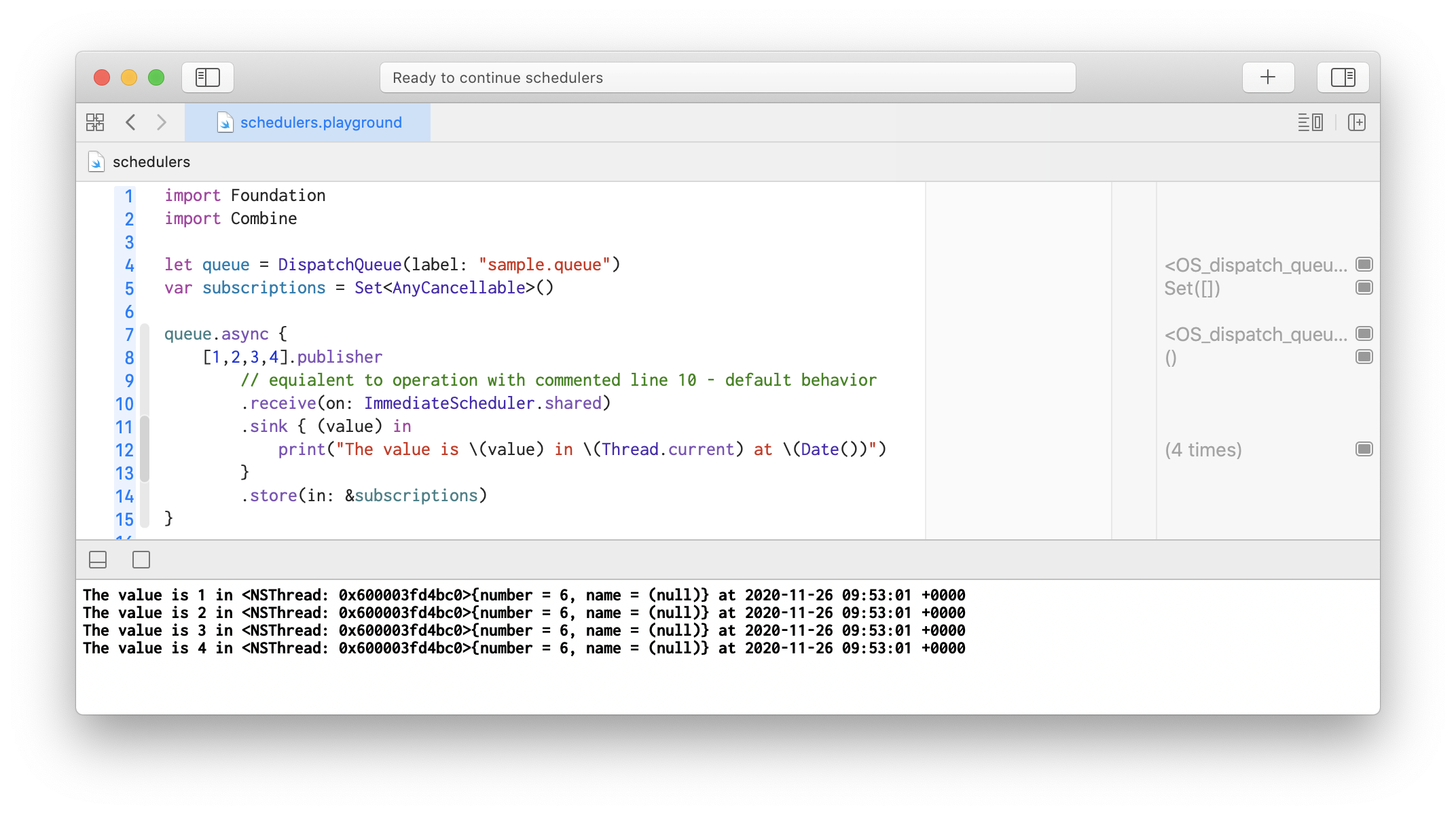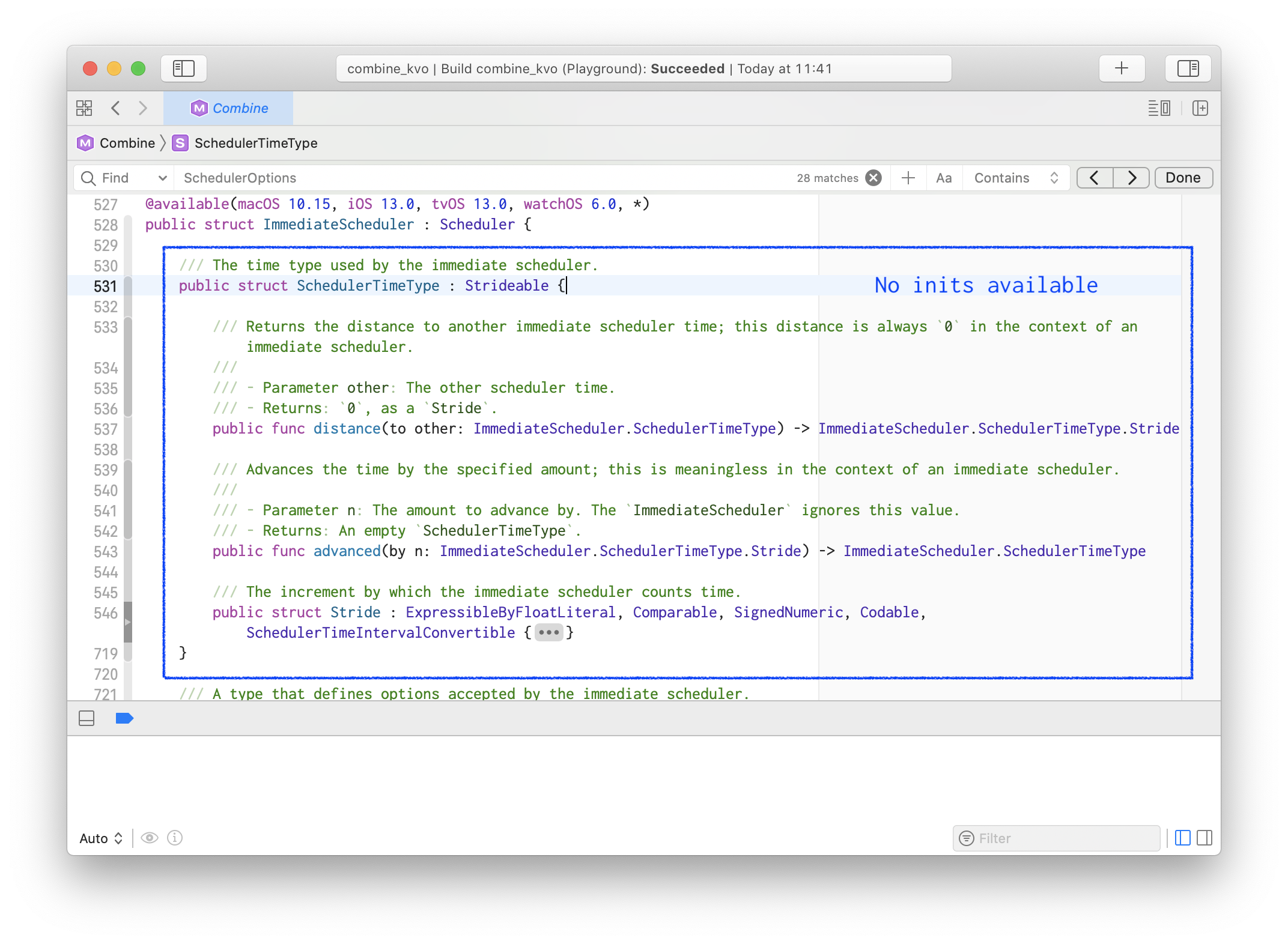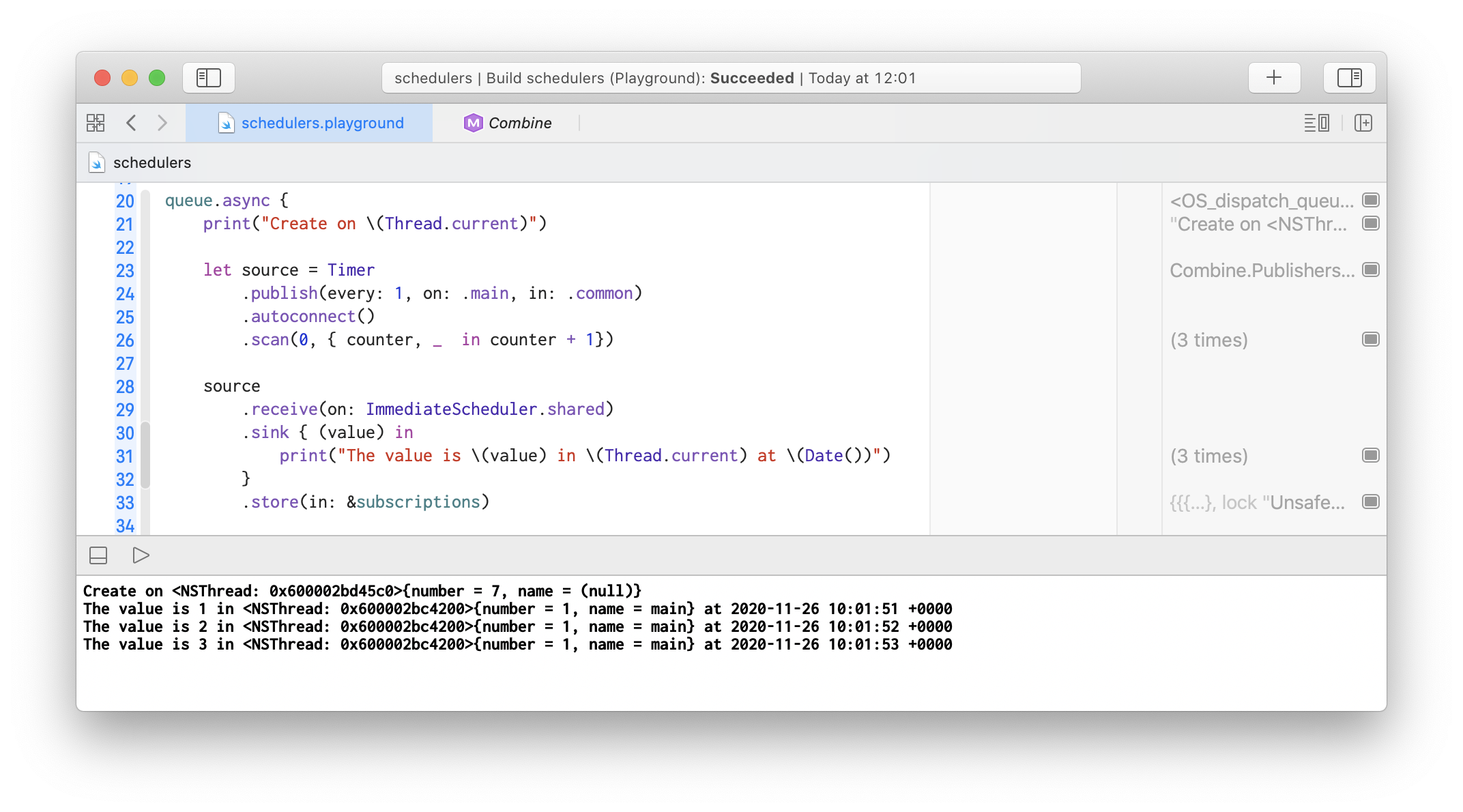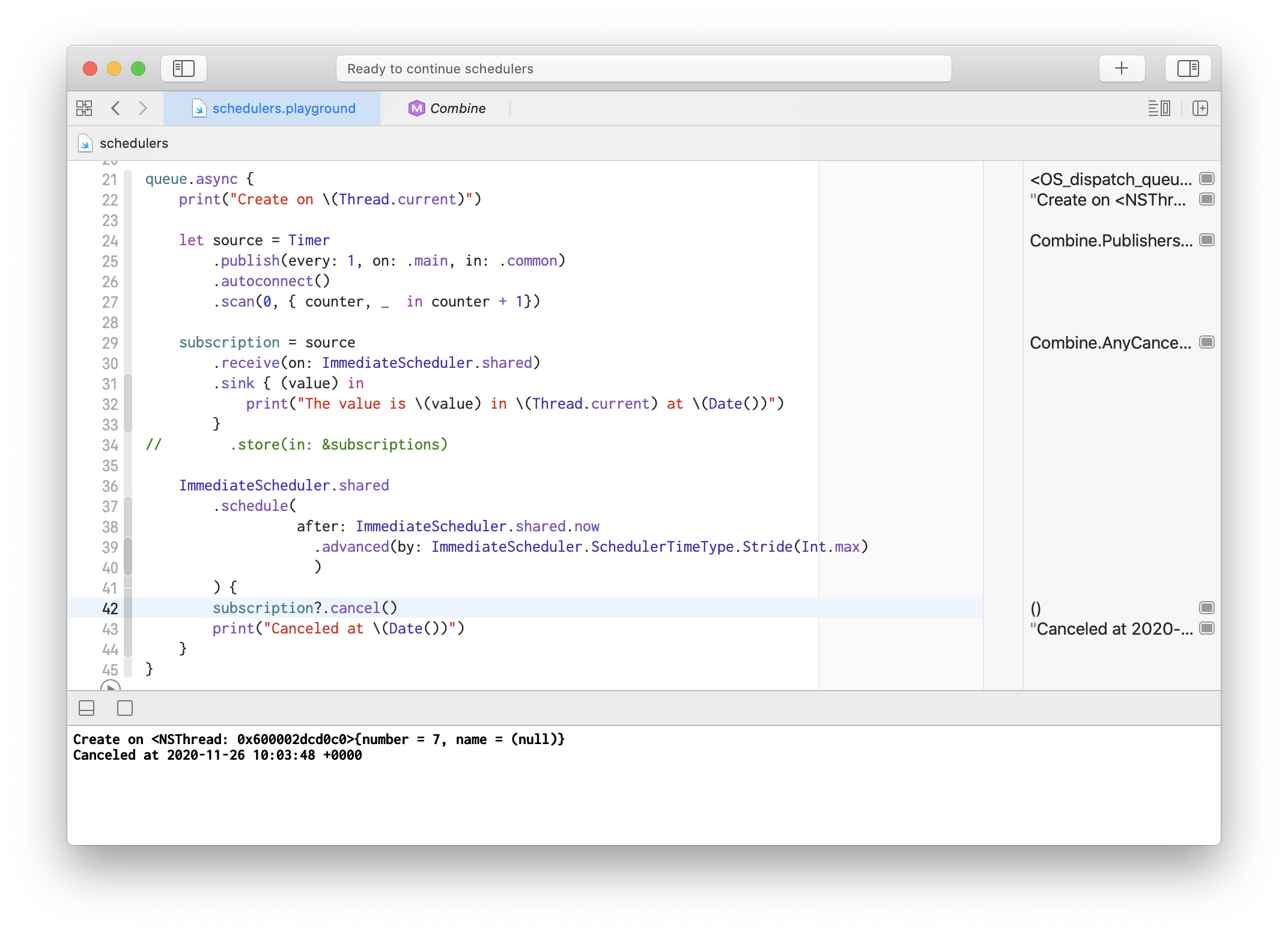Schedulers in Combine. Part 1: ImmediateScheduler
iOS Combine Estimated reading time: 5 minutesWhen we start dealing with Combine, soon we realize that threads and task managing between them are essential. Luckily for us, Combine has a build-in realization of this routine called Scheduler - ” a protocol that defines when and how to execute a closure” (Apple).
So today I would like to tell you about Scheduler and how to use it.
I’m going to cover all schedulers for Combine in this series.
In this article we will cover next:
- introduction
- main functionality
- ImmediateScheduler
Related articles:
- Schedulers in Combine. Part 1: ImmediateScheduler
- Schedulers in Combine. Part 2: RunLoop Scheduler
- Schedulers in Combine. Part 3: DispatchQueue Scheduler
- Schedulers in Combine. Part 4: OperationQueue Scheduler
intro
First aff all - is usage, thanks to Apple, it’s can be done within minimal work from our side - only one call for both subscription and for receiving event:
In addition to this 2, Combine also provide few additional:
- debounce(for:scheduler:options:)
- delay(for:tolerance:scheduler:options:)
- measureInterval(using:options:)
- throttle(for:scheduler:latest:)
- timeout(_ :scheduler:options:customError:)
Scheduler exist just to simplify everything. And instead of doing something like:
sink {
DispatchQueue.main.async {
// do something with data
}
}with Scheduler we can simply do it like this:
publisher
.receive(on: DispatchQueue.main)
.sink {
// do something with data
}So, how about Scheduler itself? Scheduler is simply an abstraction that helps you to define how and when performing some amount of work.
So as we all can imagine there are a lot of work types and purposes, and keeping this in mind Combine provide for us a few predefined types of Schedulers implementation via different types. Here they are:
ImmediateSchedulerRunLoopDispatchQueueOperationQueue
If this is not enough, we can also provide your implementation of this abstraction and handle this in your way.
So, as I mentioned before, usage is quite simple and limited to a few functions within 2 main parameters - the type of Scheduler and the options.
Let’s dive into details of each Scheduler and review the pros/cons of each one and also check their use cases.
Scheduler
Before we review each type, it’s good to understand what this abstraction can do for us. To do so, we can simply inspect the Scheduler type, and as result, we will find that that using abstraction we can:
- execute code immediately
- schedule code execution in future
- add options to control how they execute the actions passed to them
Helper types for delivering functionality above are:
- SchedulerTimeType (Describes an instant in time for this scheduler)
- SchedulerOptions (A type that defines options accepted by the scheduler)
So, so far so good :]. Moving forward.
ImmediateScheduler
Let’s start with the simplest one - ImmediateScheduler. This type of scheduler as u can see from the name used for immediate execution.
If u check official doc, u can find next - “A scheduler for performing synchronous actions”. So, simply saying it’s just a sync operation on the same thread where u create some task. Indeed this is the default scheduler.
This is quite a good option in case u want to execute the operation as is, without any delay (in the future).

U should also note, that if u even try to schedule execution on a future date - this scheduler will ignore it and execute your code immediately. If u check the ImmediateScheduler.SchedulerTimeType - parameter that can be used to schedule some work in the future, u can see that this struct has no available initialization, so it’s simply blocking us from performing and future work within it. So u can’t use any schedule(after:) variant from the Schedule protocol.

Try to create instance of this struct like
ImmediateScheduler.SchedulerTimeType()- and u will get error from compiler - ‘ImmediateScheduler.SchedulerTimeType’ cannot be constructed because it has no accessible initializers
But, we can check available API and may found:
/// The immediate scheduler’s definition of the current moment in time.
public var now: ImmediateScheduler.SchedulerTimeType { get }This means that in theory, we can set up some future date using now that is ImmediateScheduler.SchedulerTimeType and some of protocol required functions that SchedulerTimeType should implement, for example:
/// Returns the distance to another immediate scheduler time; this distance is always `0` in the context of an immediate scheduler.
///
/// - Parameter other: The other scheduler time.
/// - Returns: `0`, as a `Stride`.
public func distance(to other: ImmediateScheduler.SchedulerTimeType) -> ImmediateScheduler.SchedulerTimeType.StrideLet’s test this. Firstly let’s check normal behaviour:
let queue = DispatchQueue(label: "sample.queue")
var subscriptions = Set<AnyCancellable>()
queue.async {
print("Create on \(Thread.current)")
let source = Timer
.publish(every: 1, on: .main, in: .common)
.autoconnect()
.scan(0, { counter, _ in counter + 1})
source
.receive(on: ImmediateScheduler.shared)
.sink { (value) in
print("The value is \(value) in \(Thread.current) at \(Date())")
}
.store(in: &subscriptions)
}
In the log, we can see that events are coming as expected.
Well let’s check now that we can’t schedule ImmediateScheduler for future, as it mention in docs:
queue.async {
print("Create on \(Thread.current)")
let source = Timer
.publish(every: 1, on: .main, in: .common)
.autoconnect()
.scan(0, { counter, _ in counter + 1})
subscription = source
.receive(on: ImmediateScheduler.shared)
.sink { (value) in
print("The value is \(value) in \(Thread.current) at \(Date())")
}
ImmediateScheduler.shared
.schedule(
after: ImmediateScheduler.shared.now
.advanced(by: ImmediateScheduler.SchedulerTimeType.Stride(Int.max)
)
) {
subscription?.cancel()
print("Canceled at \(Date())")
}
}And result is:

Here u can see that cancel operation is immediate. As expected. It’s a bit strange for me, that we didn’t receive any warning or assertion from Apple, but ok, this is can be improved in the future, and we already know it.
One more moment to know - this scheduler haven’t any options to use, and if we check API, we will find that
// ImmediateScheduler.SchedulerOptions
typealias SchedulerOptions = NeverIn next part I will cover RunLoop Scheduler.
Related articles:
- Schedulers in Combine. Part 1: ImmediateScheduler
- Schedulers in Combine. Part 2: RunLoop Scheduler
- Schedulers in Combine. Part 3: DispatchQueue Scheduler
- Schedulers in Combine. Part 4: OperationQueue Scheduler
Share on: